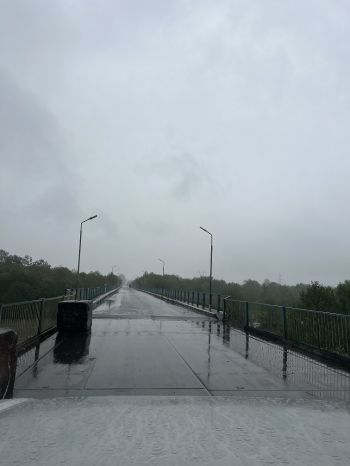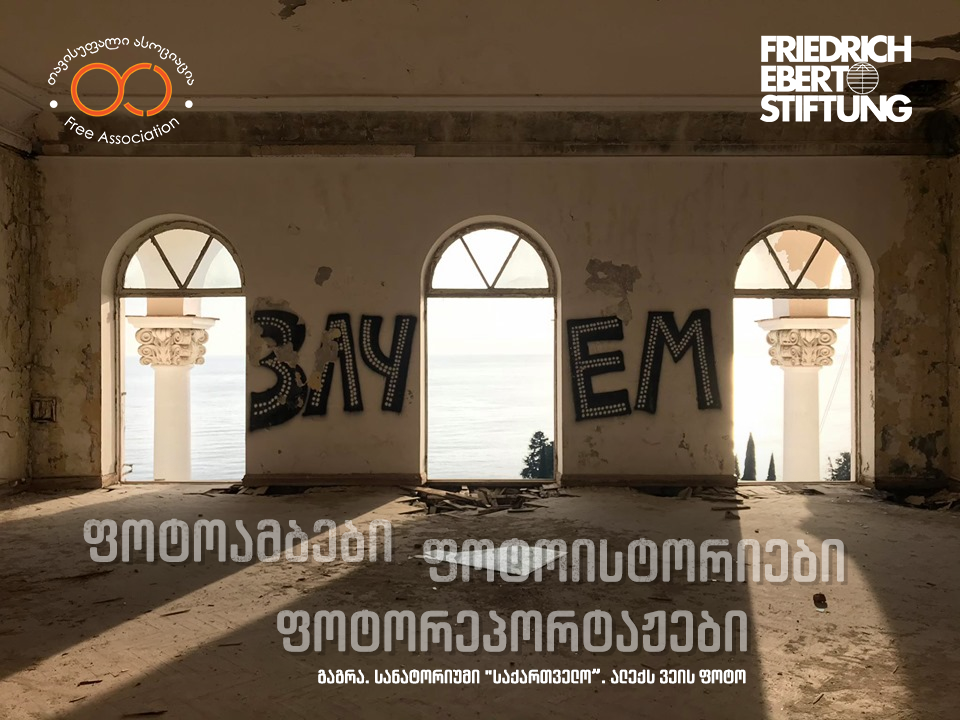მე უბრალოდ ჩემს ამბავს მოვყვები. სოხუმის ამბების მოყოლას განსაკუთრებული ხიბლი აქვს იმ ხალხთან, ვინც ეს ქალაქი იცის და უყვარს.
სოხუმში ჭანბას ქუჩაზე ვცხოვრობდი, აგურის ქარხანასთან. ეს ქუჩა კინოთეატრ „აფსნიდან“ იწყებოდა და ბესლეთის ხიდთან მთავრდებოდა, ძალიან გრძელი იყო, ძალიან.
For English scroll down ↓
ბესლეთში სახლს ვიშენებდით და ხშირად წარმოვიდგენდი, როგორი იქნებოდა ეს სახლი. სად რა იდგმებოდა, სტუმრად ვინ მოვიდოდა; რომ მოვიდოდა რას იტყოდა და მე რას გავაკეთებდი.
-
მერე ერთხელ მასწავლებელმა დიმიტრი გულიას სახლ-მუზეუმში წაგვიყვანა. მაშინ ალბათ 11-12 წლის ვიქნებოდი. ისე მომეწონა საკუთარი სახლი, მაშინვე დამავიწყდა და იქ „გადავსახლდი“. იქ „ვიღვიძებდი“ და „ვიძინებდი“, სკოლაშიც იქიდან „დავდიოდი“. ყველაფერი იქ ხდებოდა.
-
დიდი ხნის მერე, როდესაც უკვე თბილისში ვცხოვრობდი, ვცდილობდი გამეხსენებინა, მაშინ ამ სახლმა ასე რატომ მომაჯადოვა. დრომ ყველანაირი მოგონება გააფერმკრთალა და წესიერად ვერც ვიხსენებდი, როგორი იყო. რამდენჯერ მინატრია, ნეტავ, ერთხელ კიდევ შემახედა იმ ოთახებში-მეთქი. მერე ინტერნეტში ორიოდე ფოტოს მივაგენი. ჩვეულებრივზე ჩვეულებრივი მუზეუმი შემრჩა. სამწუხაროდ, რაღაცებს მხოლოდ ბავშვობაში აქვს ხიბლი და იმავე სიმძაფრით არასდროს ბრუნდება.
-
სოხუმის სახლები ყველა თავისებურად უცნაური იყო.
-
მახსოვს მეზობლის სახლი, ეზოში კლდე ჰქონდათ, რომელზეც წყარო მოწკანწკარებდა. ერთ უფანჯრო ოთახში უსაშველოდ ბნელოდა, მომდევნო კი ისეთი ნათელი იყო, თვალებს მოჭუტავდი. ეს კონტრასტი მახსოვს, ბნელში ხელის ცეცებით გაღებული კარი და მოულოდნელად დატაკებული სოხუმის მზე – თითქოს ნეგატივიდან ფერადი ფოტო გაამჟღავნესო.
-
მახსოვს სახლი, რომლის აივანზეც მუდმივად მოხუცი იჯდა, სვანური ქუდით. სკოლაში მიმავალი ყოველდღე ვხედავდი, მაგრამ დღემდე მისი არც სახელი ვიცი, არც – ბედი.
-
მახსოვს სახლი ულამაზესი რიკულებიანი კიბეებით. მასში ერთი უზრდელი ბიჭი ცხოვრობდა და ვერაფრით გამეგო, როგორ შეიძლებოდა ამისთანა კიბეების პატრონი ასეთი უკულტურო ყოფილიყო.
-
კიდევ ბევრი სახლი მახსოვს.
-
დღეს ჩემი სახლიდან მხოლოდ ცარიელი მინდორია დარჩენილი. მეორე სახლში, რომელსაც ვაშენებდით, ხეები ამოვიდა. თუმცა, ყველაზე მეტად გული მე სხვა სახლზე მწყდება.
-
თავად სახლი დიდი არაფერი, აფხაზეთის კვალობაზე ღარიბულიც კი ეთქმოდა, ადგილი იყო მოხერხებული. ჭანბას ქუჩის ბავშვები მე-13 სკოლაში ვსწავლობდით. ამ სახლის ეზო სკოლას ესაზღვრებოდა. მასზე გავლით გზას ვიმოკლებდით ხოლმე, მაგრამ ვინ გვატარებდა. დაგვინახავდა სახლის პატრონი და მოგვდევდა ყიჟინით, დამეკარგეთ აქედანო. ჩვენც ჯერ კარგად დავზვერავდით, ვინმე ხომ ჩანს ეზოშიო, მერე საგულდაგულოდ ჩარაზულ კარს გავაღებდით, ფეხაკრეფით შევიპარებოდით და თუ მაინც ძაღლი დაიყეფებდა, ან ქათამი აკრიახდებოდა, თავპირისმტვრევით გავრბოდით.
-
ხშირად მეკითხებიან: „სოხუმში დაბრუნების საშუალება რომ მოგეცეს, წახვალ?“ ვეუბნები, რომ კი. ზოგს არ სჯერა. როგორ იცხოვრებ აფხაზებთან, ან რაში გჭირდება, აქ ხომ კარგად ხარო. როგორ – ამაზე მზა პასუხი არ არსებობს. როგორც მომიხერხდება ისე. როგორც საერთოდ ცხოვრობენ ადამიანები ნებისმიერ საზოგადოებაში – ვიღაცასთან მეგობრობენ, ვიღაცასთან მხოლოდ საქმე აერთიანებთ, ვიღაცას პატივს სცემენ, ვიღაც არ მოსწონთ, მაგრამ კანონი ორივეს თმენას ავალდებულებს. სანამ არ ცდი, ვერ გაიგებ.
-
რაში მჭირდება? არ მჭირდება, მიყვარს.
-
მართლა რომ შემეძლოს, სკოლასთან რომ იყო, იმ სახლში ვიცხოვრებდი. ბავშვებისთვის პატარა ბილიკს დავტოვებდი და ვიქნებოდი ერთადერთი ადამიანი, ვისაც საკუთარ ეზოში ქუჩა აქვს.
ივლიდნენ ბავშვები მსოფლიოში ამ ყველაზე მოკლე ქუჩაზე და მეც, რამდენი წელიც არ უნდა მეცოცხლა, არასდროს დავრჩებოდი მარტო.
-
A Street in the Yard
I'm simply recounting my story. The storytelling of Sokhumi news possesses a unique charm for those who know and cherish this city. I resided on Tchanba Street in Sukhumi, near the brick factory. This street stretched from the "Apsni" cinema to the Besleti Bridge; it was exceedingly long. We were constructing a house in Besleti, and I often envisioned what this house would look like. How we would furnish it, who our guests would be, what they would say, and what stories I would share with them.
Once, my teacher took us to Dimitri Gulia's house museum. I must have been around 11 or 12 years old then. I was captivated by the house to the extent that I momentarily forgot about my own home, immersing myself in thoughts of living there. It became my waking and sleeping place, my starting point for school — everything seemed centered there.
After many years, when I had already relocated to Tbilisi, I attempted to recollect why this house had enchanted me so deeply. Time had blurred the memories, and I struggled to recall its essence. How many times had I yearned to peer into those rooms once more? Then, I stumbled upon a couple of photos on the Internet. Yet, it appeared like an ordinary museum. Sadly, some things only hold their childhood charm, never to be fully recaptured in adulthood.
Sokhumi's houses each had their own peculiarities. I recall the neighbor's house with a rock in the yard, from which a spring dripped. One windowless room was so dark that closing your eyes made no difference. I remember the stark contrast: the door would open with a clap, flooding the darkness with Sukhumi's sunlight, akin to a color photo developed from a negative.
There was also a house where an elderly man, always sporting a Svanettian hat, would sit on the balcony. Every day on my way to school, I would see him, yet to this day, I know neither his name nor his fate.
I remember a house with a beautiful spiral staircase. A discourteous boy resided there, leaving me puzzled as to how the owner of such an elegant staircase could be so impolite.
I recall many more houses. Today, only an empty field remains from my childhood home. In the second house we were building, only trees stand now. However, my heart longs most for another house.
The house itself was modest; in Abkhazia, it might be deemed poor, but its location was ideal. We, the children of Chanba Street, attended the 13th school, and this house's yard bordered the school. Crossing through the yard could shorten our journey, but who would allow us? The owner of the house would catch sight of us and chase us away with a loud reprimand: "Get out from here!"
So, we would scout carefully first, then stealthily unlock the gate and cautiously slip inside. If a dog barked or a chicken crowed, we would flee in a panic.
I am often asked, "If you were allowed, would you return to Sokhumi?" I always answer yes, though some find it hard to believe. Then they inquire, "How will you coexist with Abkhazians? What do you need there? You're fine here." To these questions, there's no easy answer. I would live as circumstances dictate, as people do in any society — forging friendships, working together, showing respect to some and disrespect to others. Adhering to the law, which requires patience from all parties.
Why do I long for it? I don't need it; I love it. If given the chance, I would live in that house near the school, leaving a small path for the children. And I would be the only person with a street in their own yard. Children would stroll along this shortest street in the world, and so would I. No matter how many years pass, I would never be alone.



















